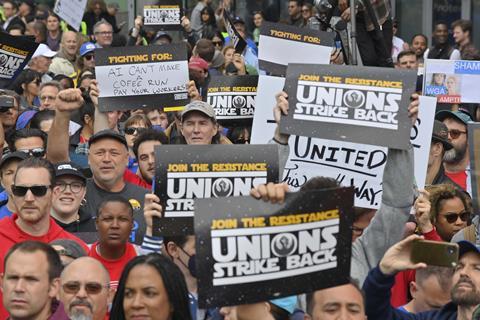
One of the longest Hollywood work stoppages in history has ended as Writers Guild Of America (WGA) members voted overwhelmingly to ratify the new contract with Alliance of Motion Picture and Television Producers (AMPTP).
The week-long ballot ended on Monday (October 9), when the union said 99% of those 11,500 WGA members who took part in the vote ratified the contract. Of 8,525 valid votes cast 8,435 were in favour and 90 (1%) were against.
The new Minimum Basic Agreement (MBA) runs from September 25 2023 through May 1 2026. The union has said it means annual gains to writers of $233m a year – less than the $429m sought in initial demands, but far more than the $86m a year previously offered by AMPTP members during negotiations.
Key demands
After 148 days on strike – the 1960 work stopage by film writers was the same length, while the longest strike was 154 days in 1988 – the sense in Hollywood is the writers on the whole are feeling positive about the new deal in which they secured key demands.
Initially those demands were contested fiercely by the Hollywood companies. WGA members held firm and when talks in August – the first since the strike bagan on May 2 – dissolved amid leaks and a heated exchange of statements, it looked as if a resolution would take far longer to reach than it eventually did.
The mood changed when the so-called Gang of Four – NBCUniversal Studio Group chairman and chief content officer Donna Langley, Netflix co-CEO Ted Sarandos, Warner Bros Discovery CEO David Zaslav, and Disney CEO Bob Iger – joined fresh talks in late September and it looked like a breakthrough might be attainable.
The writers have secured 5%-4%-3.5% pay increases over three years. While 5% is historically high – the 2020 contract increase was 1.5%-2.5%-2.25% – its impact is diminished somewhat by high inflation, which peaked at 9.1% in 2022 and is forecast to reach a 4.1% average this year.
The WGA also got writers room staffing minimums, and unprecedented viewership-based streaming bonuses for high budget streaming films and series.
The latter means that writers will get bonuses equal to 50% of the fixed domestic and foreign residuals for shows that are viewed by at least 20% of a platform’s US subscriber base in the first 90 days or the first 90 days of any subsequent exhibition year.
The bonus comes into effect for titles released after January 1 2024 and would see writers receive a $9,031 bonus for a half-hour episode, $16,415 for a one-hour episode, and $40,500 for a streaming feature over $30m in budget.
Turning to AI, the parties agreed that artificial intelligent entities are not regarded as writers under the MBA, meaning that no script generated by AI is considered literary material, source material or assigned material.
However WGA’s negotiating committee was unable to prevent the studios and streamers from using writers’ material to train large language models. Disputes arising from this point will most likely get settled under arbitration.
The strike, coupled with the ongoing 87-day SAG-AFTRA work stoppage, has had a profound impact on Hollywood production and the industry as a whole.
The non-profit, non-partisan think tank Milken Institute said in September that the WGA and SAG-AFTRA strikes have cost the California economy around $5bn, factoring in the impact on related sectors like catering and hospitality.
Late night US talk shows went off air immediately after the WGA strike went into effect on May 2 and studio film and TV projects with incomplete scripts halted production.
Among those were Marvel’s Blade, which was ready to go in front of the cameras in the summer; Universal’s Twisters (which was less than two weeks into production before it closed down, although the studio hopes to keep on course for a summer 2024 release); and the two-part holiday tentpole Wicked, which has a week or so left to shoot and whose first instalment is scheduled to open in November 2024.
Late night talk shows have returned and studio and streamer features and TV shows are expected to follow suit once the ongoing SAG-AFTRA strike ends. A number of independent productions which have received a SAG-AFTRA interim agreement are already shooting so long as the project is not covered by a WGA contract.
Hollywood contraction
By some estimates among executive sources there could be a contraction of 30% in the film and TV business, continuing a grim process of lay-offs caused by the pandemic and decline in Peak TV as studios and debt-heavy streaming platforms review costs.
Thousands of writers have not worked for the last five months and have taken their duties on the picket lines seriously. As a result fewer spec scripts are getting shopped around town at this relatively early post-strike stage – some writers refuse to work until SAG-AFTRA signs a new deal and have been picketing alongside the actors.
TV studios have suspended overall writer deals although there have not (yet) been as many terminations through the invocation of force majeure clauses as initially expected.
“Through solidarity and determination, we have ratified a contract with meaningful gains and protections for writers in every sector of our combined membership,” WGAW president Meredith Stiehm said on Monday.
“Together we were able to accomplish what many said was impossible only six months ago. We would not have been able to achieve this industry-changing contract without WGA chief negotiator Ellen Stutzman, negotiating committee co-chairs Chris Keyser and David A. Goodman, the entire WGA negotiating committee, strike captains, lot coordinators, and the staff that supported every part of the negotiation and strike.”
“Now it’s time for the AMPTP to put the rest of the town back to work by negotiating a fair contract with our SAG-AFTRA siblings, who have supported writers throughout our negotiations,” said WGA East president Lisa Takeuchi Cullen. “Until the studios make a deal that addresses the needs of performers, WGA members will be on the picket lines, walking side-by-side with SAG-AFTRA in solidarity.”
SAG-AFTRA represents 160,000 members and has been on strike for 87 days. Negotiators met with their counterparts at AMPTP in Los Angeles on Monday after resuming contract talks last week.
On Monday evening the union and AMPTP said talks would continue on Wednesday.

























No comments yet